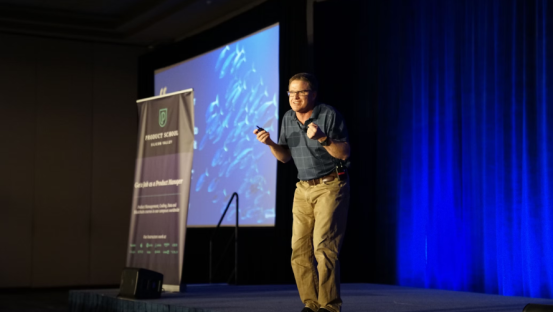Framing Your Experience on Your SpeakerHub Profile

This article is part of our special series Great SpeakerHub profiles: How to make your profile more appealing to event organizers.
Credibility matters: being able to showcase your experience can help you prove your expertise, build credibility and trustworthiness, and get hired.
The organizer needs to be able to trust that if they hire you, you will have a positive impact on their audience.
If they can see that you are an expert in your industry or on your topic, thanks to books and articles you’ve written or relevant past clients that you’ve worked with, they will already have a high degree of trust in you when they click the contact button.
Your Experience: Proving expertise
It's one thing to tell an event organizer that you are an expert, but you can take your profile to the next level by proving it.
How do you prove your expertise? One surefire way to show that other people vouch for your expertise through recommendations and testimonials, but this isn’t the only way.
Your profile offers ample room for you to showcase your expertise through:
-
Biography: Share statistics and other evidence of your impact on the audiences you’ve spoken to. This could include how many talks on your topic you’ve given, webinars you’ve offered, audience sizes and demographics, or evidence of the results your talk has had on audiences.
-
Publications (books, articles, podcasts, etc.): Show that you are sharing your expertise offstage as well as on.
-
Clients you’ve worked with: Highlight who you’ve worked with so event organizers can see what kind of audiences you speak to.
-
Awards and certifications: Highlight your accolades and education to prove your expertise.
-
Past and upcoming talks: Show that you are relevant and wanted.
Next, we will cover how to use the biography, publications, and clients sections of your profile, as these are sometimes skipped and left blank by speakers, which would be doing yourself a disservice.
Biography: How you became an expert
The biography is an area that can set a great profile apart from a good one. Speakers who understand what the event organizer is looking for will write specifically about their professional speaking experience and what they have done that has impacted audiences.
Instead of a long list of accolades, a lengthy story that takes the reader from birth to now, or an in-depth dive into your entire professional history — think about what you want the event organizer to walk away with.
Avoid writing a biography that is generic and all-encompassing, as you might do for your LinkedIn profile. Instead, focus specifically on professional speaking.
I wanted to share two great profiles from speakers who are doing things a bit differently.
A. Being respectful of the event organizers time: Dan Negroni
Some speakers have a lot to share. They have a great story and a ton of expertise, and want to outline this—at length—for the event organizer.
But this can sometimes end up being a roadblock. Imagine that an event organizer has about 2-3 minutes on your page because they are looking at over 50 different speaker profiles that day.
They start reading your biography, and click the drop-down “Read more” only to see it scroll down to what is certainly a 10-minute read.
They simply won’t read it. Hopefully, they won’t close your profile altogether and will continue to scroll down, but either way, you’ve missed the opportunity to speak to them directly.
Be conscious of the length. if you have a lot to share, consider breaking it down into different tabs, as Dan does:
There are some event organizers who will want the whole story, they might want to dive into every detail, which is why creating options is ideal.
B. Showcasing different expertise: Lauren Clemett
Some speakers might have two or three areas of expertise they would like to highlight, which do not share the same backstory or need to be approached in different ways.
I wanted to highlight Lauren’s profile because it is a clever way to talk about your different areas of expertise without trying to add them into one very long bio.
The key takeaway for writing a great biography is to write it with the event organizer in mind — what do they need to know about your experience that proves you are an expert or will be able to positively influence their audience?
Books and publications: showcasing thought leadership
When you are not on stage, how do you share your expertise with the world?
One way is to share through blogs, articles, webinars, podcasts, and books.
The books and articles section was created to help you build your credibility as a thought leader. It helps the event organizer see what kind of content you are an expert in, and gives them the opportunity to dive deeper into your content. It is also an excellent way to promote your book.
Include the most recent publications, and ensure that the publication you choose to feature reinforces your expertise.
For example, if you published a book early in your career but it has no relevance to anything you speak about now, putting this front and center can be confusing to an event organizer who is trying to frame your expertise. Be sure to tell a cohesive story with your profile, and that includes your publications.
A. Julie Christiansen: Tell a clear story
The “Books & articles” section can help reinforce your expertise. Looking at Julie’s publication section, you get an instant snapshot of her expertise. It tells a cohesive story that works together with the rest of her profile.
B. Tullio Siragusa: A variety of publications across multiple platforms
I wanted to highlight how Tullio has not only shared a straightforward timeline of published books, but has made finding additional online content clear and easy.
C. Rachael Bozsik: No books? No problem.
Don’t get hung up thinking “I haven’t published a book so I will skip this section”. You can add in the articles that you have written or co-written that showcase your expertise.
Rachael features the name of the magazine first so that an organizer who is quickly scanning the list immediately sees that she has written for well-known publishers, which reinforces her credibility.
Who you work with can make an impression on the organizer. It gives them an indication of the type of audiences you speak to, the kinds of organizations you work with, and how much experience you have.
This is why the next section, “Clients” can also play an important role in proving your expertise.
Clients: define your audience
This section is a relatively new addition to the speaker profile where you can add the different organizations you have worked with. While there is room in the “Past talks” section to explain more fully the work you have done with the different organizations, this section is a simple list.
The idea is that the event organizer can quickly get a snapshot of the kind of organizations you work with.
A. Amy Franko: a clear audience
A quick glance of Amy Franko’s clients tells you immediately that she speaks to technology and insurance companies. This tells an event organizer that she is adept at speaking to this specific audience.
B. Dr. Michelle Rozen: showing adaptability
Having a variety of organizations will give the impression that you are adaptable, and perhaps your talk is well-suited for more general audiences. On the other hand, if your topic and talk are highly industry-specific, then it is unlikely that you will have talked to a wide variety of organizations, but will more likely be specific to organizations within or related to the industry.
Dr. Michelle Rozen’s profile showcases a wide variety of well-known American companies, which gives the impression that her talk is applicable to different, high-level audiences.
We’ve talked a lot about “high-level” or “well-known” clients, but this is not a necessity when it comes to having a great profile. What is more important is to reinforce the story you are telling with your profile.
If you speak mostly to local schools and NGOs—these are important to feature.
There might be an event teacher searching for a speaker, who might see the fortune 500 companies on a speaker’s profile and automatically assume they aren’t the right fit (or budget) for their event.
Showcase the organizations you normally work with, it will give the event organizer a better picture of your experience.
C. Margaret Graziano: A powerful fusion - Clients with Awards & Certifications
When you get to the bottom of Margaret’s profile, if you are not already convinced of her expertise, the power-combo of her clients and awards & certifications will tip the scales. The two sections in tandem can tell a dynamic story.
Conclusion
If you are looking for more bookings, make your profile as appealing as possible to event organizers. Take the luck and guesswork out of the event organizer’s process by showcasing your skills and experience.
If there's anything else that we can do to help you build your speaking business, to help you get more speaking engagements, please don't hesitate to let us know.
A rising tide lifts all boats: if you succeed, we succeed. If there is anything we can do to help you, please don't hesitate to ask.
Read next
- A guide to your SpeakerHub profile | SpeakerHub
- How to establish yourself as a credible speaker
- Great SpeakerHub profiles: How to make your profile more appealing to event organizers (Introduction)
- Creating a great profile: First impressions matter
- Showcasing your expertise on your SpeakerHub profile
This article is a part of a larger series which explores how to make your SpeakerHub profile more appealing to event organizers. Want to learn more? See the whole series here.




